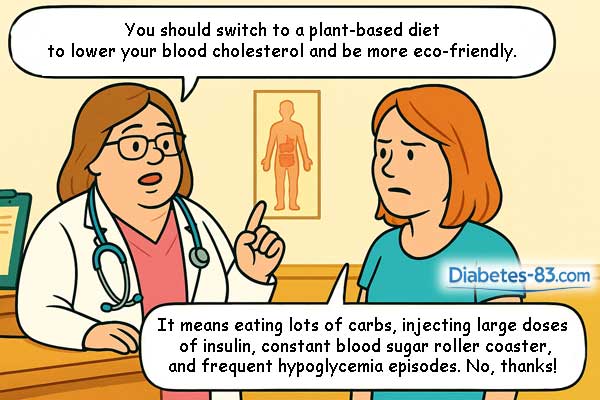Numerous books, blogs, videos, and other sources suggest that a plant-based diet is beneficial for managing both type 1 and type 2 diabetes. However, adhering to a plant-based diet will in no way allow you to maintain normal blood glucose levels as in individuals with a healthy metabolism.

The natural healthy blood glucose level for adults is 83 mg/dL ±10 mg/dL. For children before puberty, it is about 10 mg/dL less, i.e., 63-83 mg/dL. You can learn more about the recommended blood sugar target ranges here. Diabetics who adopt a plant-based diet maintain their blood glucose levels highly above those of healthy individuals. They have no other choices. Below I delve into the reasons behind it.
The misconception propagated by advocates of a plant-based diet for diabetics is that blood glucose levels ranging from 100-160 mg/dl and higher are OK. The truth is that over time, such elevated blood glucose levels inevitably lead to the development of severe diabetes complications. To safeguard your long-term well-being and avoid this undesirable outcome, embrace a low-carbohydrate diabetes management system.
Why Plant-Based Diet Fails for Diabetes
Individuals with diabetes following a plant-based or standard “balanced” diet tend to consume a lot of carbohydrates. Consequently, they require larger insulin doses to compensate for the carbohydrates consumed. However, a crucial aspect of insulin therapy for diabetes is that high insulin doses are extremely unpredictable. A large dose of insulin that effectively regulates blood glucose levels today may lead to severe hypoglycemia in the same individual tomorrow. Even in the absence of severe hypoglycemia, high insulin doses can still result in considerable fluctuations in blood glucose levels, negatively impacting overall well-being.
Diabetics who do not adhere to a low-carbohydrate diet have no other choices but to maintain consistently elevated blood glucose levels. They must do it to prevent the severe hypoglycemia caused by high insulin doses. Unfortunately, this approach inevitably contributes to the development of chronic diabetes complications. It is the primary challenge with plant-based and “balanced” diets in diabetes management that remains unresolved. Existing methods, including insulin pumps, have proven ineffective in addressing this issue. The only viable solution is to reduce the necessary insulin doses by adopting the low-carbohydrate diet.
Why Low-Carb Wins Over Plant-Based Diet for Managing Diabetes
Individuals with diabetes who transition to a low-carbohydrate diet experience a significant reduction in their insulin requirements, typically ranging from 2-8 times, with an average of 3-5 times. The lower insulin doses commonly used by individuals on a low-carbohydrate diet offer decent stability. When you inject a low dose of insulin, it’s basically impossible to go wrong enough to cause severe hypoglycemia. If mild hypoglycemia occurs, patients take no more than 1-3 grams of glucose to resolve it.
By following a low-carbohydrate diet, the risk of severe hypoglycemia disappears, enabling diabetics to maintain blood glucose levels comparable to those of healthy individuals. In addition to eliminating the risk of severe hypoglycemia, this dietary approach helps stabilize blood glucose fluctuations, resulting in noticeable improvements in overall well-being. It is important to emphasize that these benefits cannot be achieved with a plant-based or “balanced” diet for diabetes.
You don’t have to take any information you learn on this site for granted. Instead, you can experiment with different dietary approaches while regularly monitoring your blood glucose levels. After a few days, you will likely observe the advantages of a low-carbohydrate diet compared to a plant-based diet.